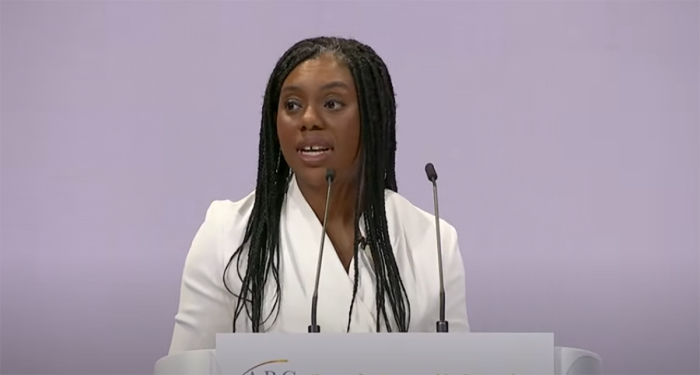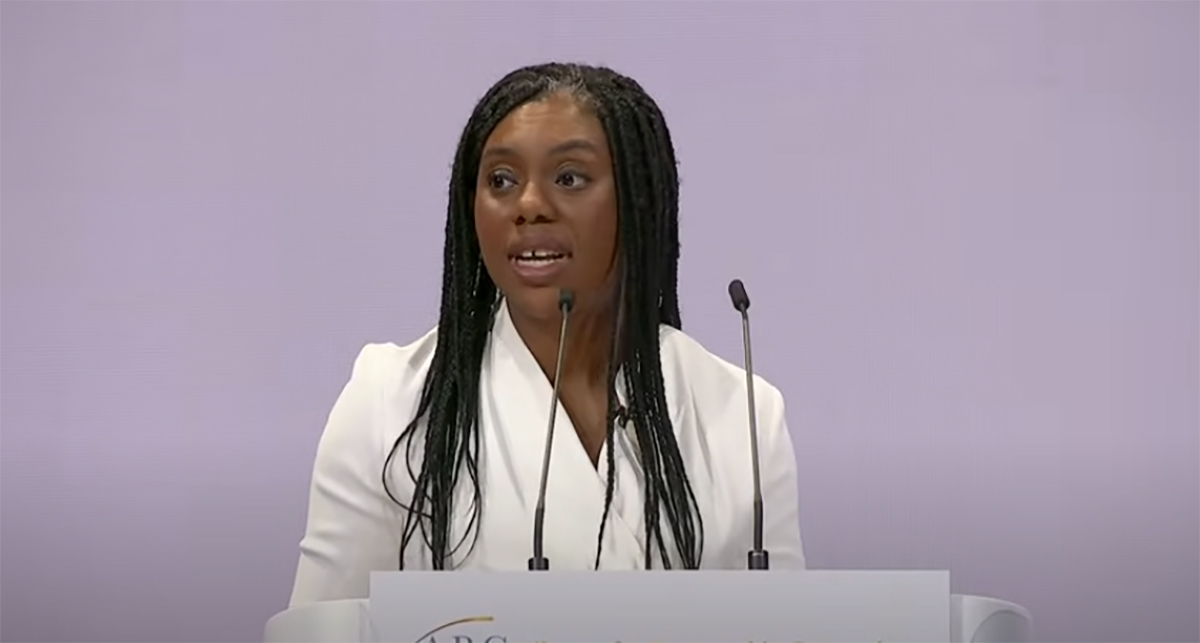
Britain’s Conservative Party leader Kemi Badenoch described the “poisonous” strains of left-wing progressivism as a threat to Western civilization and said she was determined to safeguard religious freedom during her speech at the Alliance for Responsible Citizenship conference in London.
In her address Monday, Badenoch said maintaining confidence in “classical liberal values” requires a willingness to stand firm, contending that many have “forgotten how to do so” because they are wary of legal challenges.
Badenoch cited the example of Katharine Birbalsingh, founder and head teacher at the Michaela Community School, which she described as “the best school in our country.”
“The MCA school is secular; however, religious tolerance was being exploited to harass and bully others. This led to segregation and tensions, with some students beginning to pray in the playground, violating school rules and pressuring peers to adopt new religious practices, such as wearing a headscarf or stopping choir practice. In response, Katherine banned these prayer rituals to restore order and refused to provide a dedicated prayer space, aiming to maintain the school’s secular environment and treat all pupils equally.”
She added: “The response was an orchestrated attempt to destroy her reputation and her school. She was sued by one child’s parents. The BBC ran a headline saying the school made being Muslim seem toxic. Most politicians are afraid of that sort of headline for fear of being labeled Islamophobic. Most teachers would have relented the minute they were challenged. Katherine Birbalsingh took her case all the way to the high court and she won.”
Badenoch described the environment as dominated by left-leaning policies, saying the United Kingdom has “the most Left-wing government in Europe right now” under Prime Minister Keir Starmer.
She said entrepreneurs and investors are discouraged by burdensome regulations, suggesting that trimming government waste and limiting welfare spending is the way to restore economic dynamism.
She touched on Elon Musk’s DOGE project, intended to cut the U.S. federal budget by a third, and said she felt that even this was not sufficiently radical. She proposed a similar approach in Britain to eliminate “a lot of nonsense” in the public sector. She also insisted her party must create opportunities for younger generations who might otherwise be tempted to leave the country for places where they see fewer constraints on ambition.
Badenoch also referred to a crisis stemming from liberal loopholes that allow illegal migrants and foreign criminals to remain in the U.K.
She cited a recent case in which an Albanian criminal avoided deportation after claiming his child had an aversion to foreign chicken nuggets. She said the example showed how the European Convention on Human Rights (ECHR) was “weaponized” by individuals seeking to evade removal.
Immigration appeals driven by human rights claims had grown to 34,169, she pointed out, suggesting that the figure impedes the government’s attempts to expedite deportations. She added that the legal obstacles reveal how the system has been exploited by those who seek to “erode” the nation’s identity and border security.
The conservative leader referred to another incident involving a Pakistani offender who avoided removal after citing potential hardship for his own children. She said the appeals show how applicants “use the most novel and expansive interpretations of human rights law” to block deportation.
There’s a need for legislative reform to address the “misuse” of ECHR family rights clauses. She said politicians, including Conservatives and Labour, face pressure to manage this challenge, especially amid competition from Nigel Farage’s Reform UK, which has pledged to withdraw from the ECHR entirely.
Badenoch maintained that Britain was a tolerant society but insisted the public felt angered by foreign criminals who exploit legal mechanisms. “The public are enraged at the perception that the U.K. has become a haven for foreign criminals,” she said, blaming the “crisis of confidence” in Western liberal structures.
She clarified that the foundation of the ECHR was not the issue, suggesting it worked effectively for half a century without fueling the “madness.” Instead, she argued, the problem arises from individuals and institutions that fear conflict and allow lenient interpretations of human rights law.
She associated the situation with larger cultural concerns. Calling Western society “in crisis,” Badenoch argued that “poisonous” progressive ideas have discouraged British people from defending their national interests.








